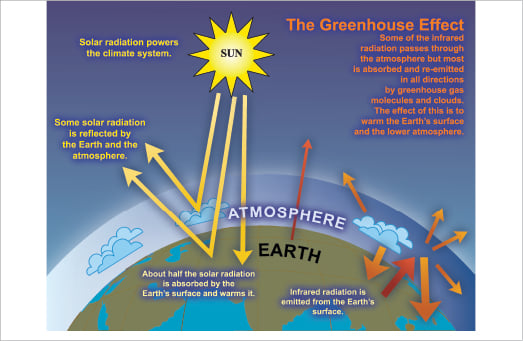Which Gas Is Most Important for Understanding Atmospheric Processes
All that can really be said about that list and atmospheric processes is that nitrogen is probably the least active of the four. Evaporation is the process of changing a liquid to agas.

Faq 1 3 Ar4 Wgi Chapter 1 Historical Overview Of Climate Change Science
Carbon dioxide affects the thermodynamics overall but only really affects ONE atmospheric process.

. Heat radiated from Earths surface is absorbed by water vapor molecules in the lower atmosphere. Carbon Dioxide CO 2 Methane CH 4 Nitrous oxide N 2 O Fluorinated Gases HFCs PFCs SF 6 References and Resources. Which gas is most important for understanding atmospheric processes.
The water vapor molecules in turn radiate heat in all directions. Based on current understanding in atmospheric models. Kaypeeoh72z and 14 more users found this answer helpful.
The most important atmospheric gas which affects weather is. Ammonia plays an important role in many atmospheric processes. Lets consider the principal GHGs one at a time starting with water vapor the most abundant greenhouse gas in the atmosphere according to NOAAs National Climatic Data Center NCDC.
Water vapor is the most important gas in the atmosphere Waters Changes of State. Which gas is most important for understanding atmospheric processes. Which gas is the most important for understanding atmospheric processes.
Some of the heat returns to the Earths surface. Water vapor is also the most important greenhouse gas in the atmosphere. The primary greenhouse gases in Earths atmosphere are water vapor H 2 O carbon dioxide CO 2 methane CH 4 nitrous oxide N 2 O and ozone O 3Without greenhouse gases the average temperature of Earths surface would.
Oxygen is the most active and is continually changing but may be considered to impact terrestrial processes more than atmospheric ones. It is the main alkaline component in the atmosphere and is highly reactive either in forming aerosols or by depositing rapidly to most of the surfaces including sensitive ecosystems Sutton et al 2007. The findings have important applications for atmospheric science and for climate change modeling.
M ethane is roughly 28 times more efficient at trapping heat in the Earths atmosphere over a 100-year time frame and c urrent levels of methane in the atmosphere are higher. The most variable of these is water vapor which is the gas form of water literally molecules of H 2 O moving around with the rest of the gases in the atmosphere. What gas is most important for understanding atmospheric processes.
Ozone is one of the most important trace gases in our atmosphere that both benefits and harms life on Earth. - That Was So Interesting. Water vapor is the gas that is the most important in theatmosphere.
Tropospheric chemistry plays a critical role in perturbing the climate by controlling the abundance and distribution of a number of short-lived air pollutants including methane tropospheric ozone and aerosols. Water vapor only averages about 04 of the total gases however it varies quite a lot depending on time and place and can be over 2 of the total under warm humid conditions. High ground-level ozone amounts contribute to poor air quality adversely affecting human health agricultural productivity and forested ecosystems.
Evaporation is the process of changing a liquid to a gas. Understanding methane sources is important because it is the second-most important contributor to global warming behind carbon dioxide and contributes to smog pollution. Thus water vapor is a second source of warmth in addition.
3 states of matter are. Which gas is most important for understanding atmospheric processes. Water vapor is the gas that is the most important in the atmosphere.
A greenhouse gas GHG or GhG is a gas that absorbs and emits radiant energy within the thermal infrared range causing the greenhouse effect. Wait a moment and try again.

Know Your Ozone It S Good Bad And Bacteria Blasting American Council On Science And Health Ozone Depletion Ozone Layer Ozone

Co2 Levels In The Atmosphere Rose At A Record Pace In 2013 Carbon Cycle Carbon Sink Greenhouse Gases

Comments
Post a Comment